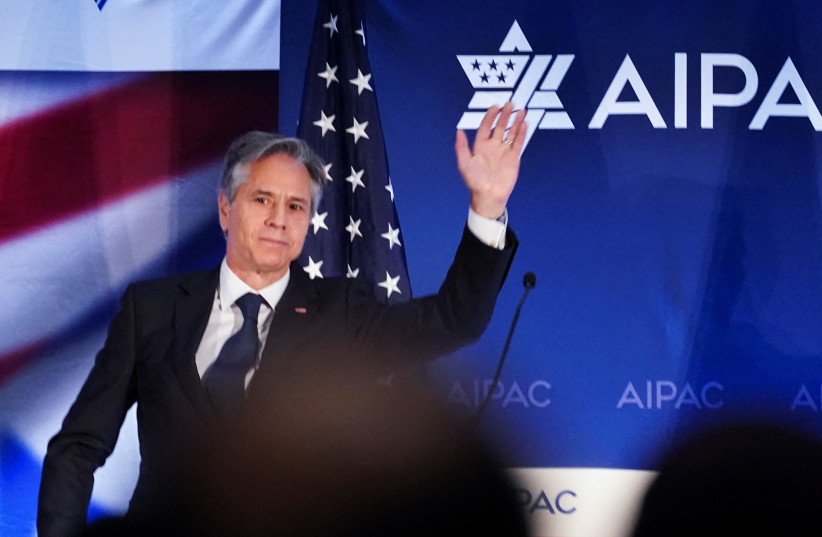Many people reduce the state of US-Israel ties to when US President Joe Biden will invite Prime Minister Benjamin Netanyahu to the White House.
A Biden invitation means the ties are good; no invitation means they are bad. The longer Biden delays, according to this way of thinking, the more this indicates that the relationship between Jerusalem and Washington is in the doldrums.
Forget that senators and members of Congress from both sides of the aisle come here regularly, as do governors. Forget that the head of Centcom, General Michael “Erik” Kurilla, is a frequent visitor. Forget that Strategic Affairs Minister Ron Dermer and National Security Adviser Tzachi Hanegbi were in Washington this week for talks.
None of that matters. None of that attests to a robust relationship. According to those interested in highlighting differences between the US and Israel, the only true gauge is whether Biden wants to see Netanyahu in the Oval Office.
If the president does not want Netanyahu as a guest – as Biden unceremoniously said on March 28, at least not in the “near term” – then Netanyahu’s political opponents and the heads of the anti-judicial overhaul movement use that as proof that Netanyahu and the overhaul are seriously damaging Israel’s relationship with its greatest ally.
 A MEMBER of the audience, wearing a US-Israel themed suit and kippah looks on at the AIPAC policy conference in Washington in 2020 (credit: TOM BRENNER/REUTERS)
A MEMBER of the audience, wearing a US-Israel themed suit and kippah looks on at the AIPAC policy conference in Washington in 2020 (credit: TOM BRENNER/REUTERS)Blinken speaks at AIPAC
But then along comes US Secretary of State Antony Blinken, who throws a wrench in this love-on-the-rocks narrative. On Sunday, Blinken delivered a warm pro-Israel address to an American Israeli Public Affairs Committee (AIPAC) gathering in Washington.
The US-Israel partnership “touches on every aspect of our lives, from security to business, from energy to public health,” Blinken said. “And the depth and breadth of that partnership between our governments are matched only by the strength of the ties between our peoples. This partnership between the United States and Israel is indispensable.”
Or consider some of his further remarks: “The US-Israel relationship is underwritten by the United States’ commitment to Israel’s security. That commitment is non-negotiable; it is ironclad.”
Or this: “This year, we have more joint [military] exercises scheduled than at any point in our history.”
Or this: “America is more secure when Israel is strong.”
Those words give testimony to the strength and breadth of the relationship and run contrary to the feeling that the lack of a Netanyahu-Biden powwow in Washington is the be-all and end-all sign of a strong relationship.
The UN General Assembly meeting convenes on September 20. Don’t be surprised if Netanyahu and Biden meet then as part of Netanyahu’s likely trip to New York to address the UN.
Is a Biden invitation to Netanyahu important? Undeniably, because chemistry and the personal relationship between leaders have a huge impact on the tenor of ties. It is also essential in that it sends a message to Israel’s friends and enemies alike about the intimacy of the relationship.
But is such a meeting all-important? No, the relationship between the two countries is wide enough and deep enough to withstand a year without a prime ministerial visit to Washington.
The bulk of Biden’s 3,000-word speech to AIPAC was positive. One paragraph dealt with Blinken reiterating Washington’s more than five-decade-old policy of opposing settlement growth. Predictably, however, that paragraph was highlighted in many reports about the speech.
Why? Because that paragraph underlined where the countries disagree, and in the US-Israel relationship, the news is where there is disagreement, not agreement.
“Settlement expansion clearly presents an obstacle to the horizon of hope that we seek,” Biden said, reasserting America’s support for a two-state solution. “Likewise, any move toward annexation of the West Bank, de facto or de jure, disruption of the historic status quo at the holy sites, the continuing demolitions of homes and the evictions of families that have lived in those homes for generations damage prospects for two states.”
That, however, is not a reflection of a relationship in dire straits, but rather a reiteration of well-known and oft-repeated American policy.
Six months ago, Blinken addressed the annual conference of the left-wing JStreet. A comparison of that speech with the one he gave to AIPAC on Sunday shows that in many cases the message – and even the wording – were identical. However, specific differences showed Blinken was aware of his audiences and was playing to them.
For instance, to JStreet, where his comment about being against settlement expansion was met with applause – which was not the case at AIPAC – he dwelt longer on what the US was doing for the Palestinians.
He spelled out that, since Biden came into office, the US has re-engaged with the Palestinian people and resumed providing them with nearly a billion dollars in assistance.
In the JStreet speech, Blinken mentioned two things that he did not repeat at AIPAC: that the US, while it continues to recognize Jerusalem as Israel’s capital, views the city as “central to the national visions of both Palestinians and Israelis and must be a city for all its people.”
Also, in that speech, which took place after the Israeli elections but some three weeks before the new government was formed, he referenced settler violence, something not mentioned in his words to AIPAC.“We’re deeply concerned that this year has seen dramatically higher levels of violence in the West Bank, perpetrated by both Palestinians and Israeli settlers. This violence must stop. Its perpetrators must face equal justice under the law.”
In the section on Iran, where to both audiences the bottom line was that Iran cannot and will not be allowed to acquire a nuclear weapon, at the JStreet confab, Blinken dwelled at some length on the mistake the Trump administration made in leaving the Joint Comprehensive Plan of Action – something left out of his speech to AIPAC.It is also interesting to note the elements in the AIPAC speech that he did not say to the JStreet crowd. First, in a brief section dealing with antisemitism, he said this to AIPAC: “And we’re combating antisemitism, which we know fuels and intersects with hatred towards Israel.”
Blinken didn’t say that to JStreet, which lobbied the administration to tone down the IHRA working definition of antisemitism in its recently released national strategy to combat antisemitism, so as not to conflate anti-Zionism with antisemitism.
Regarding the Abraham Accords, in a rare salute to anything the Trump administration did, Blinken said, “We will soon create a new position to further our diplomacy and engagement with governments, the private sector, non-governmental organizations, all working toward a more peaceful and a more connected region in order to achieve significant historic progress to deepen and broaden the Abraham Accords, building on the work of the Trump administration.”
At the AIPAC gathering, he spoke of appointing an envoy to further regional integration into the region; at JStreet, he announced the administration’s appointment of Hady Amr as the administration’s special representative to the Palestinians.
To the AIPAC crowd, Blinken said that the US “has a real national security interest in promoting normalization between Israel and Saudi Arabia.” He barely mentioned the Saudis in his speech to JStreet, an organization that does not smile on US ties with Riyadh.
Finally, on Sunday to AIPAC, Blinken alluded to the judicial reform issue in Israel, reiterating the US position of “support for core democratic principles, including a separation of powers, checks and balances, and the equal administration of justice for all citizens of Israel. We will speak honestly and respectfully with our Israeli friends, as partners always should and as we always do. As Israeli leaders and citizens debate these issues, we welcome efforts to find consensus on any reforms. That’s simply the best way to make sure that they’re embraced and that they endure.”Blinken’s speech to JStreet came before the judicial reform was born, but after the 2022 election, when it was clear Netanyahu would form a hard-right government. His words then prefigured what he would say to AIPAC. “As President Biden told Mr. Netanyahu when he called to congratulate him, we expect the new Israeli government to continue to work with us to advance our shared values, just as we have with previous governments.
“We’ll continue to express our support for core democratic principles … We will hold it to the mutual standards we have established in our relationship over the past seven decades. And we will speak honestly and respectfully with our Israeli friends, as partners always should.”
None of that sounds like a breakdown of the US-Israel relationship. Yet, for those who gauge the ties through the prism of when Biden will extend an invitation to Netanyahu, a breakdown is where the countries are headed.










